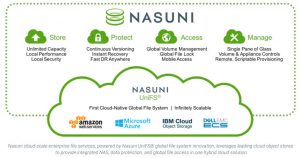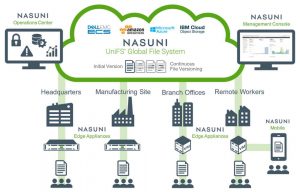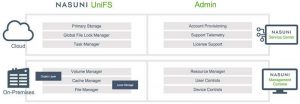Nasuni Extending Hybrid Cloud File Services Platform
Enhancing scalability, security, and manageability for customers adopting object storage for global file collaboration and NAS consolidation
This is a Press Release edited by StorageNewsletter.com on December 22, 2017 at 2:59 pmNasuni Corp. announced its hybrid cloud solution that uses object storage to modernize legacy NAS, file server, backup, and DR infrastructure.
Click to enlarge
A range of scalability, security, and manageability enhancements have been added to meet the needs of the company’s growing installed base, setting a standard for unstructured data management in the cloud. Customers are able to accelerate multi-site file sharing, provide continuous access to files even in the event of cloud disruptions, and integrate the UniFS global file system more tightly with on-premises IT architectures and Amazon, Azure, Dell EMC, and IBM object storage.
“We look at Nasuni as our global file server, finally giving us a single place to store, organize, share, and protect all our creative project files across all locations,” said David Cottman, manager, graphic solutions, IDL Worldwide, part of global brand development group SGK, Inc. “Many of the features in this new release will make it easier to extend the power of Nasuni and object storage to all our business units, enabling our designers, architects, and project leaders to take client service, and our business, to the next level.“
Click to enlarge
Product enhancements:
-
Faster multi-site file propagation. Unstructured data snapshots are now processed in small directory ‘shards’ instead of entire volumes. With this patented technology, shards can be processed in parallel, reducing snapshot processing time, enabling data to be propagated across the company’s Edge appliances more quickly, and giving users in different locations faster access to shared files.
-
Scalable VM caches. Edge appliance VMs that cache active files on-premises now span multiple local storage devices, enabling customers to create file servers that are as big as their virtual infrastructures allow.
-
RESTful management API. The first release of the management API provides programmatic access to information about volumes, Edge appliances, and notifications for workflow automation, business unit chargeback, and data analysis. The next release of the API will extend this read-only support with scriptable provisioning and configuration.
-
LDAP support. Adding to the existing support for Active Directory, LDAP can be used to authenticate users who are connecting to Edge appliances for on-premises access to file shares and group directories.
-
Azure Government validation. The company works with Microsoft Corp.‘s cloud service for US government agencies and their partners, and is available as a technical preview for evaluations.
-
API support for third party audit solutions. Enterprises that need to guard against malicious file attacks and comply with audits will be able to use the firm’s solutions with Varonis Systems, Inc. and other third party auditing solutions once their integrations with the company’s Audit API are released.
-
NFSv4 encrypted connections. Files and metadata shared by Edge appliances across local networks using the popular NFS protocol can now be encrypted, making on-premises access to shared files even more secure.
-
Improved handling of legacy Windows permissions. New volume-level permission policies enable legacy Windows Security Identifiers (SIDs) from previously acquired companies or older departments to be processed to accelerate cloud migrations and the company’s solutions deployments.
-
Cross-region redundant global file lock servers. The firm’s Global File Lock, the scalable cloud service that permits one author at a time to edit a file across all locations, offers protection against regional service disruptions. Cross-region replication with failover in less than three minutes enables a lock server in another Amazon region to resume the service.
UniFS diagram
Click to enlarge
“Global enterprises are relying on Nasuni to help synchronize large-scale file workloads across many office locations,” said John Capello, VP, product strategy, Nasuni. “This release shows our commitment to improving how Nasuni integrates with these complex IT environments at scale. Our focus when adding new capabilities, whether it is LDAP support, the RESTful API, or support for leading third-party auditing solutions, is making the overall platform simpler to operate while continuously improving scalability and performance.“












 Subscribe to our free daily newsletter
Subscribe to our free daily newsletter

